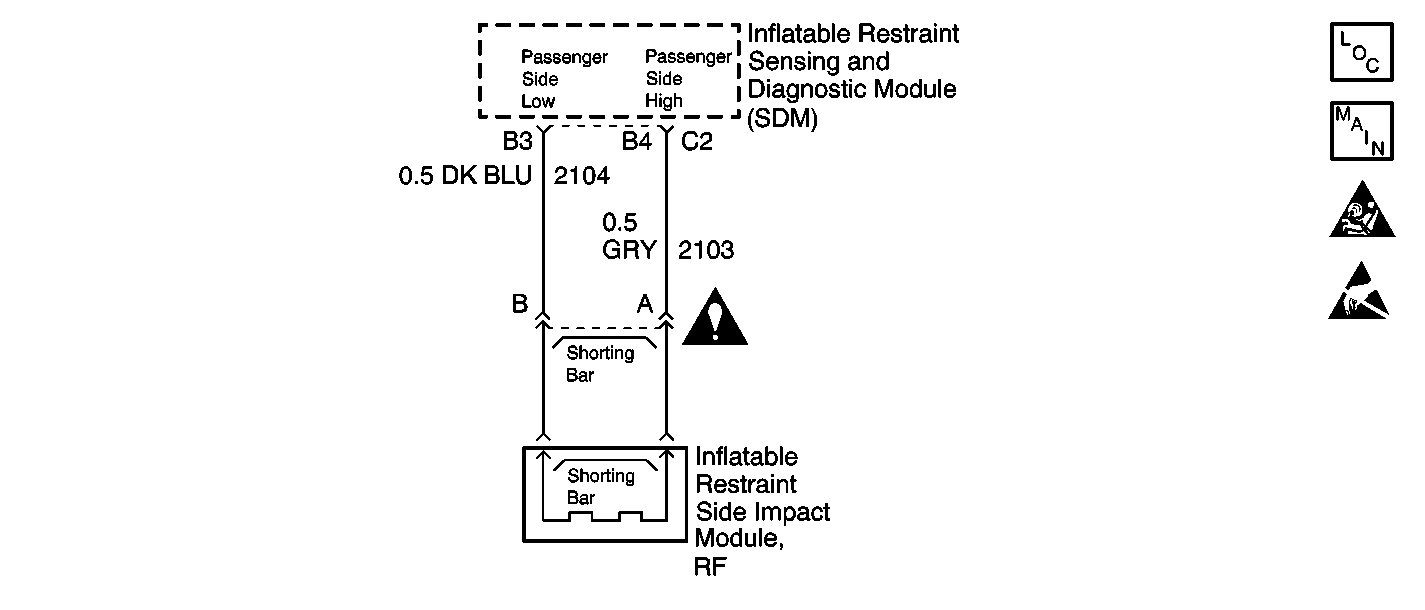
Circuit Description
When you first turn the ignition switch to the RUN position, the inflatable restraint sensing and diagnostic module (SDM) performs tests to diagnose critical malfunctions within itself. The SDM then performs the following continuous diagnostic tests on the deployment loops:
| • | Deployment loop voltage out of range test |
| • | Deployment loop resistance measurement test |
If the voltage out of range test detects a short to voltage condition, the resistance measurement test for that deployment loop will not be performed.
Conditions for Running the DTC
| • | Ignition 1 voltage is within the normal operating voltage range. |
| • | Passenger side deployment loop is not shorted to voltage. |
Conditions for Setting the DTC
| • | The SDM detects the voltage at passenger side high is greater than 6 volts for 500 milliseconds. |
| • | The SDM detects the voltage at passenger side high is less than 2.4 volts and passenger side high to low side resistance is less than 6 ohms for 500 milliseconds. |
Action Taken When the DTC Sets
| • | The SDM disables the passenger side deployment loop resistance test. |
| • | The SDM commands ON the AIR BAG warning lamp via Class 2 serial data. |
| • | The SDM also sets this DTC as current after an accident. The SDM will write the status of this DTC to the "crash log" area of the EEPROM for retrieval. |
Conditions for Clearing the DTC
| • | Passenger side high is 6 volts or less for 500 milliseconds. |
| • | Passenger side high is 2.4 volts or greater and passenger side high to low side resistance is less than 6 ohms for 500 milliseconds. |
| • | You issue a scan tool CLEAR CODES command. |
| • | A history DTC will clear once 255 malfunction free ignition cycles have occurred. |
When the SDM detects that no DTCs are present, the SDM commands the AIR BAG warning lamp OFF.
Diagnostic Aids
The following can cause an intermittent condition:
| • | A short between the passenger side high and the passenger side low circuits. |
| • | A malfunctioning shorting bar on the inflatable restraint side impact module 2-way connector. |
| • | Refer to Testing for Intermittent Conditions and Poor Connections in Wiring Systems. |
Test Description
The number(s) below refer to the step number(s) on the diagnostic table.
-
This step inspects the RF inflatable restraint side impact module in-line connector.
-
Tests for a malfunctioning RF inflatable restraint side impact module.
-
Tests for a short to ground in the passenger side high deployment circuit.
-
Tests for a short to ground in the passenger side low deployment circuit.
-
Tests for a short to voltage in the passenger side high deployment circuit.
-
Tests for a short to voltage in the passenger side low deployment circuit or if there is a malfunctioning SDM.
Step | Action | Value(s) | Yes | No | ||||||
|---|---|---|---|---|---|---|---|---|---|---|
1 | Did you perform the SIR Diagnostic System Check? | -- | ||||||||
Do the connectors exhibit any signs of corrosion, terminal damage, or poor connections? | -- | |||||||||
3 |
Did you complete the replacement? | -- | -- | |||||||
4 |
Does the scan tool indicate that DTC B0030 is current? | -- | Go to Diagnostic Aids | |||||||
Does the scan tool indicate that DTC B0030 is current? | -- | |||||||||
Does the resistance measure less than the specified value? | OL | |||||||||
7 | Locate and repair a short to ground in the passenger side high deployment circuit. Refer to Wiring Repairs in Wiring Systems. Did you complete the repair? | -- | -- | |||||||
UsingJ 39200 DMM measure the resistance between the inflatable restraint sensing and diagnostic module (SDM) wiring harness connector passenger side low circuit terminal and a known good ground. Refer to Circuit Testing in Wiring Systems. Does the resistance measure less than the specified value? | OL | |||||||||
9 | Locate and repair a short to ground in the passenger side low deployment circuit. Refer to Wiring Repairs in Wiring Systems. Did you complete the repair? | -- | -- | |||||||
Does the voltage measure less than the specified value? | 1 V | |||||||||
11 | Locate and repair a short to voltage in the passenger side high deployment circuit. Refer to Wiring Repairs in Wiring Systems. Did you complete the repair? | -- | -- | |||||||
Using J 39200 DMM measure the voltage between the inflatable restraint sensing and diagnostic module (SDM) wiring harness connector passenger side low circuit terminal and a known good ground. Refer to Circuit Testing in Wiring Systems. Does the voltage measure less than the specified value? | 1 V | |||||||||
13 | Locate and repair a short to voltage in the passenger side low deployment circuit. Refer to Wiring Repairs in Wiring Systems. Did you complete the repair? | -- | -- | |||||||
14 | Replace the inflatable restraint sensing and diagnostic module (SDM). Refer to Inflatable Restraint Sensing and Diagnostic Module Replacement . Did you complete the replacement? | -- | -- | |||||||
15 | Replace the RF inflatable restraint side impact module. Refer to Inflatable Restraint Front Seat Side Impact Inflator Module Replacement . Did you complete the replacement? | -- | -- | |||||||
16 |
Does the DTC reset? | -- | System OK |
